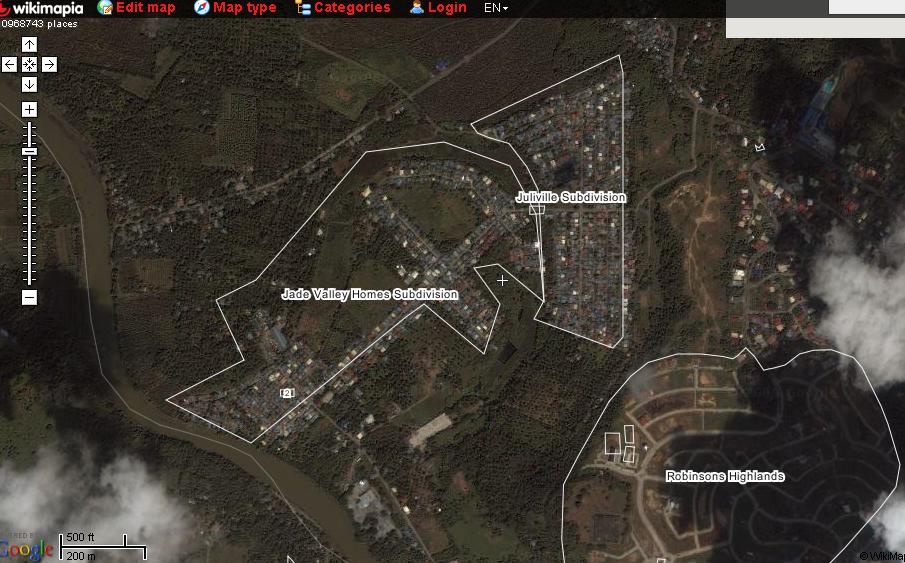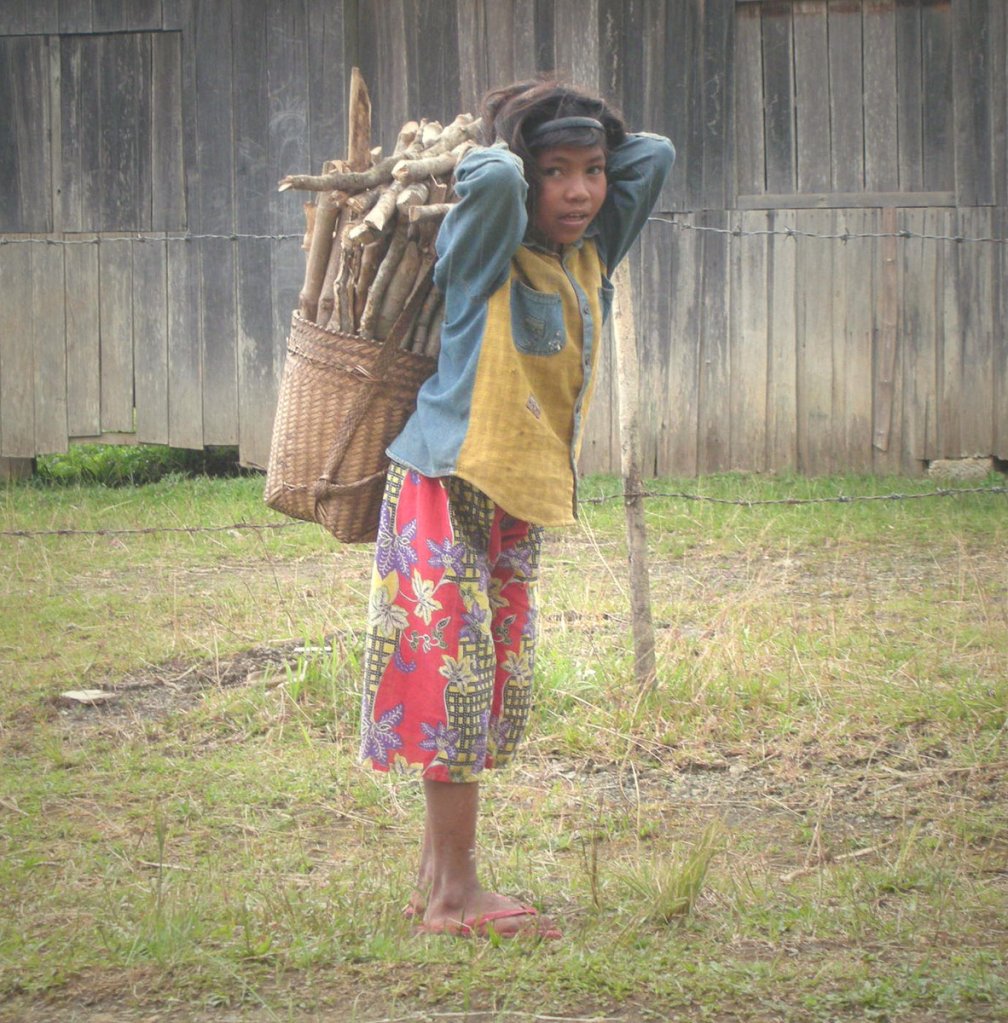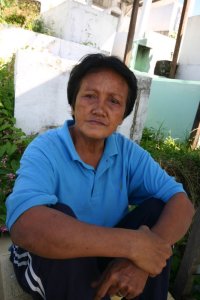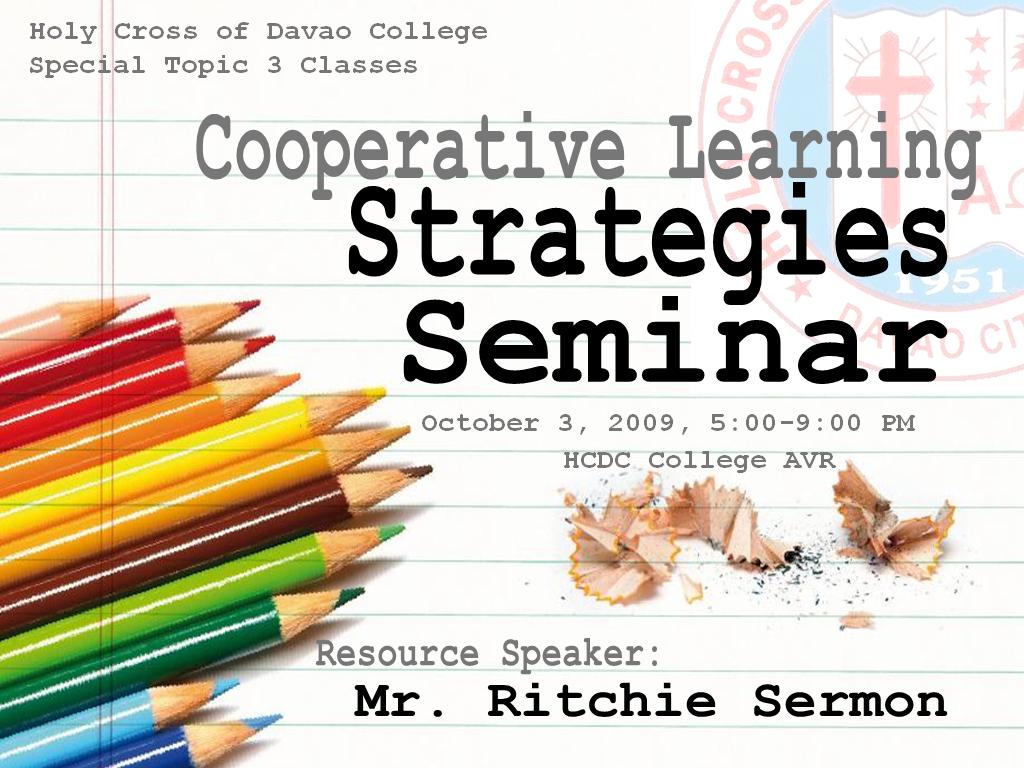Wednesday, September 30, 2009
The case for English proficiency
Over at Jose Carillo's English Forum, Jose Carillo, the English usage columnist in Manila Times, made the case for English proficiency:
A call to arms
 My first memories of a flood are probably of when we were still living in Jade Valley, a low-lying subdivision located along the Davao River. If I remember it right, the place was visited by floods for four times over. They said the worse flood was during the fourth time when the water reached as high as the rooftop.
My first memories of a flood are probably of when we were still living in Jade Valley, a low-lying subdivision located along the Davao River. If I remember it right, the place was visited by floods for four times over. They said the worse flood was during the fourth time when the water reached as high as the rooftop.To me, however, it was the third time because I had experienced it myself---by the fourth flooding, we had already moved out of Jade Valley. On March 15, 2000 (Araw ng Davao!), around 2 o'clock in the morning, somebody was knocking hard on the door, telling us to evacuate as the water was rising fast. When we went out of the house, bringing nothing but the clothes we're wearing, the water was already knee high.
We safely evacuated in Juliville, another subdivision adjacent to Jade Valley. For several days, my siblings and I stayed in my grandmother's house, in Lanang, but my parents stayed in Juliville, and waited for the water to subside.
[caption id="attachment_1090" align="aligncenter" width="458" caption="An aerial view aboard a Philippine Air Force chopper shows devastation brought by Tropical Storm Ketsana in Cainta, province of Rizal , eastern Manila. (Photo courtesy of PSDMN---Private Sector Disaster Management Network)"]
 [/caption]
[/caption]So we were spared from the ravages of the flood. But when we came back, I heard many stories from my friends. Some recounted how hard it was to wait for rescue that they weren't sure whether it would come. Some recounted how they staved off their hunger and thirst. Others told me how they tried, if vainly, to save their furniture and belongings. Last week, those memories came flooding as I watched on TV, and saw the flooding in many parts of Luzon.
Tuesday, September 29, 2009
Despite, not because of, their English
 Last Saturday, I bought Fish Liver Oil Emulsion, a food supplement manufactured by a Chinese company named Qingdao Double Whale Pharmaceutical Co., Ltd. A leaflet, which contains a little explanation of the product and an instruction on dosage, came with it.
Last Saturday, I bought Fish Liver Oil Emulsion, a food supplement manufactured by a Chinese company named Qingdao Double Whale Pharmaceutical Co., Ltd. A leaflet, which contains a little explanation of the product and an instruction on dosage, came with it."Fish Liver Oil Emulsion, composed of fish liver oil, concentrated frash orange juice, vitamins A, D and C," the leaflet said, "can improve health and promote growth, It is agreeable in taste, good for both women and infants, and will be more effective if administered frequently."
I've spotted only two errors in this passage: one, the word "fresh" was misspelled as "frash." Two, the punctuation that came after the first sentence should be a period, not a comma.
Sunday, September 27, 2009
To hold or not to hold
There are those who argue that President Obama should, because it's an affront to the basic law of the land, the Constitution. On the other hand, there are those who argue that President Obama should not, because it just distracts the administration from dealing with more pressing matters, chief of which the battered economy.
On the January 11th edition of ABC’s “This Week, when asked whether he will "...appoint a special prosecutor...to independently investigate the greatest crimes of the Bush administration, including torture and warrantless wiretapping," the then President-elect Obama didn't give a black or white answer.
"We’re still evaluating how we’re going to approach the whole issue of interrogations, detentions, and so forth," he said. "And obviously we’re going to be looking at past practices and I don’t believe that anybody is above the law. On the other hand I also have a belief that we need to look forward as opposed to looking backwards. And part of my job is to make sure that for example at the CIA, you’ve got extraordinarily talented people who are working very hard to keep Americans safe. I don’t want them to suddenly feel like they’ve got to spend all their time looking over their shoulders and lawyering [up]."
But Paul Krugman, the Nobel Laureate slash economist slash blogger, begged to differ.
"I’m sorry," Krugman wrote, "but if we don’t have an inquest into what happened during the Bush years — and nearly everyone has taken Mr. Obama’s remarks to mean that we won’t — this means that those who hold power are indeed above the law because they don’t face any consequences if they abuse their power."
Why I'm bringing this up?
Because now that we are about to choose, among others, our next president (sana walang umaswang sa election), one question that we might find ourselves asking is, "Will the next president hold the past administration accountable for its many abuses?"
It's too early to say if someone will, but based on the presidentiables' earlier remarks, it seems that nobody won't.
Saturday, September 26, 2009
The Free Lancer: A PBA Finalist
If they didn't, would they deign to nominate their blogs in the first place?
Meanwhile, I'm happy to note that "The Free Lancer" is a 2009 PBA finalist under the Personal category.
A personal blog, the PBA said, is "a blog that covers the personal. A diary or a journal a record and treasure chest of one’s thoughts and ideas. It could be on any topic from the food eaten this morning to national issues. The important thing is that it is one’s personal take on the issue."
Though some of the finalists have been in this business of blogging for well over many years now, I feel competitive with them.
Why do I feel so?
Wala lang. I just feel it. I believe I'm saying something in this blog that nobody does. After all, there's only one blogger who goes by the name of Arvin Antonio Ortiz.
If you encountered any, please tell me. But it's improbable---only celebrities and prominent people always fall prey to identity thieves.
P.S. I would have wished that Silence Kills! was nominated and eventually got into the finals of the 2009 PBA under the Advocacy category, one of the new categories in the 2009 PBA, so that it will be given more prominence.
Thus it will gain ground.
Silence Kills! is "a loose coalition of bloggers who blog about human rights in general, and about extrajudicial killings in Davao City in particular."
But unfortunately, it didn't make the grade.
Thursday, September 24, 2009
Me, going to law school?
I don't know why, but law school always fascinates me.
That 's why I read Erich Segal's novel The Class, a story of Harvard men, some of whom went to Harvard Law School.
That's why I watched from the beginning till the end the Koreanovela Love Story in Harvard. Ostensibly set in Harvard but was actually set in University of Southern California and University of California, Los Angeles, Love Story in Harvard is a story between a Harvard Law School student and a Harvard Medical School student.
That's why I like John Grisham's books. That's why I want to watch The Paper Chase.
That's why I read Erich Segal's novel Love Story, a story also set in Harvard and whose protagonist is also a Harvard Law School student.
That's why I bought a VCD of Love Story, the film adaptation of Segal's novel.
At some point in my life, I dreamed of becoming a lawyer. I didn't seriously think, though, about the matter. But my father said something that prompted me to give it a serious thought.
The night before last night, he told me that my uncle asked if I am willing to go to Law School because he's willing to support me.
Tell him yes, I told my father.
I know being a law student is no picnic, or walk in the park if you want. As one blogger, who had gone to law school himself, put it, "law school isn’t easy. It’s a lot of hard work and pain. A lot of sleepless nights and mental anguish. Law school is unlike anything you have ever experienced, unlike anything you could even imagine. Law school requires you to dedicate everything you have to it: your mind, your body and even your soul."
There are some questions, the same blogger said, that one should consider before going to law school:
Do you really want to be a lawyer?
Honestly, I want to be a teacher, but only because I know my parents can't afford to send me to law school.
Can you handle pressure?
I have fared in college, I think I can do the same in law school.
Can you study every day for four years (five if you count the bar)?
I think I can if my mother will exempt me from all the household chores.
Can you handle not having lots of free time (for anything)?
Today, I'm not having lots of free time because I'm a working student---and, thank God, I haven't become anti-social. I think I can do the same feat in law school?
Can you afford law school?
My uncle says he can.
Monday, September 21, 2009
Qué barbaridad!
FYI, I'm a student assistant assigned in the Internet Laboratory housed inside the H.S. Library of Holy Cross of Davao College (HCDC). My job as an S.A. is, well, to assist Internet users---students, teachers, co-SAs.
One time, a teacher asked for my assistance. (Much as I want to name this teacher, politeness tells me otherwise. But for convenience's sake, let's call him Sir B---B meaning "bald.")
"Paki-print ko ani Vin," said Sir B, pointing to the information on the screen.
I looked at it for a while, then followed his instruction.
As I hand the printout to him, I asked, "Para sa asa diay na, Sir?"
"Para sa akong masteral," he said matter-of-factly, as though his credibility were still intact.
"Ah, I see."
When Sir B got out of the lab, I chuckled because the information he got came from answers.com.
answers.com as his source of information for his MA Degree?
Qué barbaridad!
I pity not the teacher, but the students who're under his care---or scare.
Sunday, September 20, 2009
Forgive and forget?
...he [Teodoro] has announced that the prosecution of officials for corruption will not be his priority, because it is the Ombudsman’s job.
Questions: What if the Ombudsman will not move, as it has shown and is showing nowadays? Will it be a forgive-and-forget situation then under Teodoro's administration?
But actually, there's no reason to worry about the tack Sec. Teodoro will take if he will be the president of this country.
Reason: I'm sure as hell Sen. Noynoy Aquino will win in 2010.
Saturday, September 19, 2009
How not to make a concerned citizen?
Social Studies is always a fringe subject. Look around: In college, only few are specializing in it. Take Holy Cross of Davao College, where I'm studying. Out of the more than 2,000 Education students, there are only about 75 students majoring in Social Studies. In high school, students so loathe the subject that they have no qualms skipping it.
"In today's world," Dr. Serafin D. Quiason and Prof. Fe B. Mangahas wrote, "our educational planners have come out with a strange concoction in the form of a collected set of subjects called Makabayan, which is a misnomer."
"Lamentably," Dr. Quiason and Prof. Mangahas continued, "Makabayan is the antithesis of patriotism, nationalism and one's sense of national identity. Although the package is well intentioned, Makabayan presents Filipino culture and history in a hodgepodge fashion, void of the vital element of continuity in the study of our past."
It is really sad that a subject so important as History is so conveniently taken for granted. As if its relegation to the Makabayan were not enough, the government sent it further down into the abyss.
On August 25, 2009, the Department of Education (DepEd) issued Department Order No. 90 (DO 90). It is DepEd's "response to the alarming size or population of learners in a class or crowded classrooms, safety of young pupils and clamor for lesser learning loads."
Thursday, September 17, 2009
'Estudyante ni?'
Yet how come we know so little about something we spend most of our lives doing? For instance, do we know who is considered student and who is not? Do we know who can avail of fare discounts and who cannot?
One evening, while I was on my way home, I overheard a conversation between a man and a woman. Was I so privy that I heard them talking? Or was it because they talked so loud? Or both?
Anyway, the man, who was wearing a red shirt and has a receding hair line, had just paid his fare.
"Estudyante ni?" the driver asked.
Apparently, the man in red didn't hear the driver, so he asked the woman beside her, "Unsa daw?"
"Estudyante ba daw?" replied the woman, who wore a pink shirt and wore her hair in a pony tail.
"Titser siguro na," someone quipped when the man in red was having trouble answering the question.
"Dili nong, regular na," the man said at last.
He then turned to the woman in pink and said, "Katanduon unta ko ba." But, he added, "estudyante man pud nang second courser, di ba?"
The woman merely grinned, then said, "Pero tiguwang na man gud tanawon. Naa na pu'y trabaho."
I agree with the man that a second courser is still a student. He is not, however, entitled anymore to a fare discount that the regular students enjoyed.
I want to write like...

Gay Talese
Tuesday, September 15, 2009
Historical Society T-shirt
[caption id="attachment_926" align="aligncenter" width="459" caption="Front"]
 [/caption]
[/caption][caption id="attachment_927" align="aligncenter" width="459" caption="Back"]
 [/caption]
[/caption]
Come out in the open
 When I established Silence Kills, a blog dedicated to the issue on extrajudicial killings in Davao City, I thought I would be a voice in the wilderness. I thought no one would give a damn with what I say.
When I established Silence Kills, a blog dedicated to the issue on extrajudicial killings in Davao City, I thought I would be a voice in the wilderness. I thought no one would give a damn with what I say.But when I started to receive comments from the readers (there are only few), I realized I'm not alone. I'm happy to note that there are people who share my views regarding extrajudicial killings in Davao City. Take this comment from Anonymous on my post about Mayor's Duterte challenge to CHR Chair Leila de Lima:
Even if Duterte ostentatiously relinquished his supervision over the DCPO, no policeman would dare disobey his orders – legal or otherwise. And the beauty of it is that he can actually sabotage Davao's peace and order by allowing crimes to happen so that the Davaoeños will blame the CHR for attacking their mayor and causing his 'resignation' as deputized Napolcom representative, resulting in criminals gaining courage to walk the streets again. Who are you kidding, Mayor?
But I'd be happier if those who speak against Duterte won't hide from the cloak of anonymity. I know it's not easy to be identified as anti-Duterte. It's like going against the tide. But this is not about who's pro-Duterte and who's anti-Duterte.
It's about fighting for our deeply held principles: truth and justice.
Friday, September 11, 2009
Child labor?
[caption id="attachment_893" align="aligncenter" width="435" caption="Photo by Jed I. Bete"]
 [/caption]
[/caption]Thursday, September 10, 2009
'Exile from human memory'
 [/caption]
[/caption]What are the perils of indifference?
That was the question around which Elie Wiesel's speech, “The Perils Indifference,” revolves. “The political prisoner in his cell, the hungry children, the homeless refugees —not to respond to their plight, not to relieve their solitude by offering them a spark of hope is to exile them from human memory…,” Elie Wiesel said at a Millennium series lecture held in White House and hosted by then US first couple Mr. and Mrs. Bill Clinton.
When Wiesel, a 1986 Nobel Peace Prize Laureate, spoke those words, he had in mind the victims of the tragic episode in humanity's history that was the Holocaust.
But it is not too far off the mark to include Clarita Alia among those exiles from “human memory.” Call it inflated, but that is where Clarita Alia is right now: Gone from the memory of the people. Her cries remain unheeded; her demands seemed to fall on deaf ears. Over the years, Clarita Alia has been clamoring that justice be served for the death of her four children: Richard, 18; Christopher, 16; Bobby, 14; Fernando, 15—all were knifed to death. But she seemed clamoring in vain.
Already in her 50s and now a widow, she single-handedly raised her eight children by selling vegetables at Bankerohan, one of Davao City’s largest public markets. Like all mother, she dreamed of giving her children a bright future. But the environment Mayor Rodrigo Duterte created would make that dream just that: a dream.
Birds of the same feather won't catch each other
In the September 6 episode of “Gikan sa Masa, Para sa Masa,” where Mayor Rody Duterte sometimes settles scores with his enemies, Mayor Duterte urged the Commission on Human Rights (CHR) to come back and investigate the resurgence of killings in the streets.
“Wala na ko mogunit sa pagkasupervisor sa DCPO [Davao City Police Office],” Duterte said. “Though my resignation was not accepted, I told them that I consider myself resigned. Sukad sa CHR inquiry, wala na ko misulod sa DCPO. Pero natingala ko ngano man padayon gihapon ang patay?”
On March 30, 2009, the CHR conducted a highly publicized public inquiry into the killings in Davao City that have gone unabated since 1998. Leila De Lima, the CHR’s feisty chairperson, squarely put the blame on Mayor Duterte’s shoulders for his failure to stop the killings, if not for his tacit support to the DDS.
To give the CHR a free hand in its inquiry, Mayor Duterte resigned as a supervisor of the DCPO on March 31, the second day of the public inquiry. His resignation, however, was rejected by DILG Secretary Ronaldo Puno, saying it’s against the mandate of the law.
Now five months after the CHR started the public inquiry, it seems Mayor Duterte is laying the blame at the feet of CHR Chair Leila De Lima.
In August alone, there were 13 people killed; in September, seven. Mayor Duterte asked the CHR to explain the killings. Surely somebody else is responsible for them, and, contrary to popular belief, it certainly not him because he has already given up control over the police.
“Mangutana ko karon, ngano man padayon lang gihapon ang patay?” Mayor Duterte asked. “Is there somebody behind it? Is there somebody trying to create a chaotic condition? Is there somebody who wants to pain a picture of Davao City as killing fields?
“I leave it to the CHR to please come back to Davao City and investigate more. I’d like the human rights to come back and tell us what is this all about?”
It’s clever of him to say those words because it effectively cast the CHR in a bad light. It’s as if Mayor Duterte is saying that the commission made a wrong decision by asking him to distance himself from the police, from whose ranks the DDS gunmen allegedly come. It’s as if he’s saying that the commission should let him do his own thing because it’s the only way to deal with the city’s criminality. Otherwise, the situation just might go berserk.
Yet Mayor Duterte’s remarks have only exposed an anomaly in his administration. The City Mayor’s Office has at its disposal a P450 million budget for Peace and Order. If needed, the mayor can disburse as much as P1.2 million daily. “With this enormous sum of public funds given to…the city mayor to maintain peace and order in the community,” said Mindanao Daily Mirror columnist Bert Tesorero, “there is no reason why street killings would go unabated for almost a decade now without a single case solved by the police.”
The police cannot be accused of ineptitude, either.
I can think of only one reason why the police find it hard to stamp out the killings. According to the report of the New York-based Human Rights Watch, “You Can Die Anytime,” most members of the DDS are policemen, ex-policemen, rebel returnees, military personnel, and jobless youths who were involved “in a bit of drug pushing.”
“The DDS…,” it further noted, “is run by handlers. Such a handler is called the amo (boss). The amo is usually a policeman or ex-policeman, and in some cases, a barangay official…A local journalist, who has been investigating extrajudicial killings in Davao City for almost ten years, believed that all handlers report to the police precinct commander in their area who distributes money for “operations” and reports, in turn, to an official in the city government—‘the big boss.’”
Despite these damning revelations, police and military officers denied that they are by no means involved in the killings.
If, however, they are involved in the killings, as claimed by the Human Rights Watch, then how can we expect them to get after the criminals if the criminals themselves come from their own ranks?
Wednesday, September 9, 2009
09/09/09
Also, Noynoy Aquino, Cory's only son, announced today that he would join the presidential race in 2010.
"I am accepting the responsibility to continue this nation's fight," Noynoy said. "I am accepting the challenge to lead this fight. I am running for the presidency in the coming election."
But let us revert to Cory's death. It’s but human nature that when one is about to die, one seeks atonement, no matter how venial or mortal his or her sins are. Cory did just that when she was in her deathbed.
By contrast, Mao Zedong, whose 33rd death anniversary the world over is also commemorating today, didn’t seek atonement at all. He didn’t take the trouble of asking for forgiveness. What he should ask forgiveness for? For the well over 70 million deaths he caused under his regime. Nor did he admit he had wronged.
Mao Zedong, born on December 26, 1893 into a well-to-do peasant family in Hunan Province, founded the People’s Republic of China in 1949.
In Mao: The Unknown Story, an 800-page tome, the authors Jung Chang and Jon Halliday made known what still consumed Mao in his last days.
“Hatred, frustration, and self-pity dominated Mao’s last days,” Chang and Halliday said.
*
Two days after I struggled to finish Albert Camus’ La Chute (The Fall), I began reading John Steinback’s The Grapes of Wrath today.
When I borrow a book, I make it a point to look at the Due Date Slip of the book and see when the book was first borrowed and the last time it was loaned out. I did the same when I borrowed The Grapes of Wrath yesterday. The first time it was borrowed was on August 8, 1997 and the last time was on September 5, 2007. In between that decade, only seven people bothered to borrow, let alone read, the book.
Does this imply something about the reading taste of Holy Crossians? I leave the matter for the librarians to debate.
I’m still on the first few pages of The Grapes of Wrath, but I’ve had a fair idea what the book is about. “Particularized in the story of the Joad family,” said its back cover, “the novel is not only a powerful dramatization of the forced migration of the “Okies” from their bank-foreclosed fields and farms; it is a dramatization as well of the plight of the dispossessed everywhere.”
Writing in The Nation in 1939, the year when the book first appeared, Louis Kronenberger said of the book:
“The Grapes of Wrath is superb tract because it exposes something terrible and true with enormous vigor. It is a superb tract, moreover, by virtue of being thoroughly animated fiction, by virtue of living scenes and living characters…”
I think I can relate to this novel because our family was once driven out of our property five years ago.
Saturday, September 5, 2009
Spending half a day at the COMELEC Office
My brother and sister and mother, having gone to the gym, advised me to go there early to beat the crowd. By 6 in the morning I went there, only to find out about 25 more people were already waiting. Like them, I waited for two hours, stood in the heat of the sun, and went home still unregistered.
My mother berated me. "Kana dugayan man gud," she said. "Tan-awa, wala na hinuon ka narehistro."
Months later, she would still prod me to go and register.
Having had enough of my mother's ire and having realized lately that it's time to take my duties to my country seriously, I sent a note yesterday to my online friends that I'd be going to the COMELEC office at Magsaysay Park today. I then told my mother of my plan when I arrived home at night.
Did I go?
Friday, September 4, 2009
'Thou still hast thy fun'
In Chapter XII of the book, he wrote an “Ode to a Corrupt Politician (with apologies to Shelley) which, to my unlettered literary mind, is classic, meaning its message borderless and its lessons timeless.
The poem was written half a century ago, but remains as relevant as before. “Believe it or not,” Prof. Gonzalez said, “I wrote this…poem, in Cambridge in 1959, paraphrasing the ‘Ode to a Nightingale’ which was written by that Oxford poet Shelley. There were at that time corrupt politicians in the Philippines, there still are. We hope someday this breed will disappear. Then the Filipinos will see the light of day, as Rizal too hoped.”
I don’t know how Prof. Gonzalez got it wrong, but the “Ode to a Nightingale” is not Shelley’s opus but John Keats’. What he paraphrased instead must be Shelley’s “To a Skylark,” whose first lines ran thus:
Hail to thee, blithe Spirit!
Bird thou never wert—
That from Heaven, or near it,
Pourest thy full heart
In profuse strains of unpremeditated art.
Still, the mistake is no matter. It does not distract the reader from understanding the message the poem tries to communicate.
Thursday, September 3, 2009
Mr. Zombie
 [/caption]
[/caption]My friends in college wondered why I know lots of foreign words and phrases. They are sometimes amazed how I could easily rattle off Latin phrases like “Ignorantia legis non excusat,” “Dura lex, sed lex,” “Volo non valeo.”
There is, of course, no mystery with my ability. I owe a great deal of it to Mr. Felipe Zombilon, my English teacher in third year at Davao City National High School.
Of all the teachers I know, he’s the only one who is not offended when called Mr. Zombie. In fact, he himself told us right from the start that he preferred to be called Mr. Zombie. I don’t know why he relished the moniker. Is it perhaps to strike terror among the students? Not really. Oftentimes he is more jovial than terror.
Wednesday, September 2, 2009
Native kindness
[caption id="attachment_835" align="aligncenter" width="414" caption="The man in black on the left is Datu Mamayas"]
 [/caption]
[/caption]“Travel,” Mark Twain wrote, “is fatal to prejudice, bigotry and narrow-mindedness, and many of our people need it sorely on these accounts. Broad, wholesome, charitable views of men and things can not be acquired by vegetating in one little corner of the earth all one's lifetime.”
That we need to travel to unlearn our prejudice, bigotry and narrow-mindedness is true. I've proven this to myself some years back when my classmates and I went to Sitio Namnam, a place situated deep into the hinterlands of East Marahan, Marilog District.
For someone like me who lives in the city, I only have little knowledge on the indigenous people. What do they look like in person? How do they live? What language do they use when speaking?
Tuesday, September 1, 2009
Ma'am G, how could I thank thee?
I first met Ma’am Lourdes Gamutan, who is affectionately called Ma’am G, when I enrolled in her Literature 1 (Philippine Literature) class. My friends heard so many terrifying stories about her, so that when they learned it was Ma’am G who would be handling the class, they dropped the subject. They transferred to other Lit 1 class handled by an ostensibly more lenient teacher. They persuaded me to follow them, but persuaded me in vain.
Naïve as I am, I stayed with Ma’am G’s class. My friends warned me of an impending doom. Like anything impending, their warning is still impending. I didn’t regret that I stayed with Ma’am G’s class. But my friends did regret their decision to drop out of her class. They shouldn’t have transferred, they told me later. I found out that their teacher was even worse. At the end of the semester, I got 95 from Ma’am G. Their teacher gave most of them 80.
Ma’am G is really generous when it comes to giving grades. I proved this for the second time when I enrolled in English 2 that Ma’am G handled. I think I got 94 or higher in my English 2.
But it was not the high grades she gave me that I will remember Ma’am G the most. Rather it was her antics, which remain as fresh in my mind as when I first heard them.

